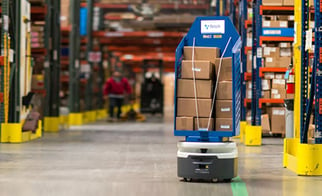This session focuses on mobile device management (MDM)—what it is, why you need it, what to consider before deployment, and how to support these tools throughout your organization.
Featuring


- Greg Henry, Vice President of Client Services, Barcoding, Inc. (Host)
- Brian Harvey, Senior Systems Engineer, Barcoding, Inc.
Greg Henry: [00:00:00] This is Greg Henry, Vice-President of Client Solutions for Barcoding, Inc. Welcome to the third session in our five-part series called Android in the Enterprise. Joining me today is Brian Harvey, Senior Systems Engineer at Barcoding, Inc. and today's focus is: mobile device management (MDM): what, why, and how?
[00:00:20] In the previous two sessions, we discussed how fast the Android operating system is evolving, with frequent OS and security updates. Additionally, we've discussed on previous calls, how these updates are driving more frequent application updates. We're going to focus on mobile device management, or MDM, as it is often referred to.
[00:00:41] At its core, MDM applications are used to keep mobile devices current with the most recent releases of the OS and security updates, as well as application patches.
[00:00:51] However, these tools provide more than just simple OS and application updates. They can enforce policies, encrypt data, provide device remote control, and even perform complete device wipes due to a security breach. MDM gained its popularity during the Windows CE era, but with Android, MDM is no longer a luxury—it's really a requirement.
[00:01:14] I've asked Brian to join this session. He has extensive experience with several MDM tools and a great understanding of the what, why, and how. Brian, as someone who deals with mobile devices in a wide selection of mobile applications every day, can you describe why an Enterprise user of Android needs to embrace an MDM tool, and even more importantly, mobile device support?
Brian Harvey: [00:01:41] Absolutely. So, as you alluded to, MDM is no longer really an option for the current generation of devices with the ability to perform the security updates and OS updates, remote application updates, version control, compliance, device lockdown. Being able to do remote control for support, and being able to do locations controlling—, there's just a myriad of options that are available that we can't live without at this point.
Greg Henry: [00:02:11] Great insight, Brian. When we talk about MDM tools, there have also been a couple of different methods to deploy these tools. While cloud computing is becoming more commonplace today, MDM tools not only support Cloud deployments, but they also can be deployed on-premise.
[00:02:28] Can you talk a little bit about what a customer should consider when they're choosing their deployment strategy?
Brian Harvey: [00:02:34] Yeah, absolutely. So, with the viability of the cloud option, whether it is company hosted, or MDM hosted, it just seems to be an easier option to support. There's less of a headache with the hardware support. If updates need to be done, they're usually facilitated by an expert with that product, so the liabilities lessons. There is an on-premise option available if companies need it, and it's completely usable as well. If I had to pick, I'd pick the cloud.
Greg Henry: [00:03:04] I would actually agree with you as well: cloud deployments, from my experience, are much faster and easier to get off the ground and running, if nothing else. In the early days of MDM, many our customers thought these tools were really kind of “set it and forget it,” meaning once you deployed it, you're pretty much be done with all of the updates and patches that are associated with Android.
Brian, can you talk about what kinds of skill sets, or the type of resources, are needed to support these tools? Is this something that customers need to invest in internally, or can they consider using an outsourced partner?
Brian Harvey: [00:03:42] The companies can certainly use their own IT staff to support their MDM. Barcoding offers our expertise as well, and we can facilitate training and support from both sides.
Greg Henry: [00:03:54] Again, great information. And yes, customers need to recognize that folks like us at Barcoding, Inc., can support this for them. Or, if they desire, they can make their own internal investment in their own people to support these products as well. As we bring this session to a close, are there any other best practices, or things you think folks should consider as they move to Android?
Brian Harvey: [00:04:19] Just be prepared for changes. Everything changes almost daily, it seems, so there's always something new around the corner and we need to be prepared for it.

Greg Henry: [00:04:29] That is probably the wisest thing I've heard. Android does frequently change. One thing we've seen over the last couple of years is constant change out of the Android environment. And I want to thank you, Brian, again for the real-world input you've experienced.
[00:04:47] This concludes session three of our five-part series. During our next session, we'll be discussing deployment best practices and financial considerations. Once again, I want to thank you for those that are listening and looking forward to our next session.
Contact us for your mobile computing needs!







